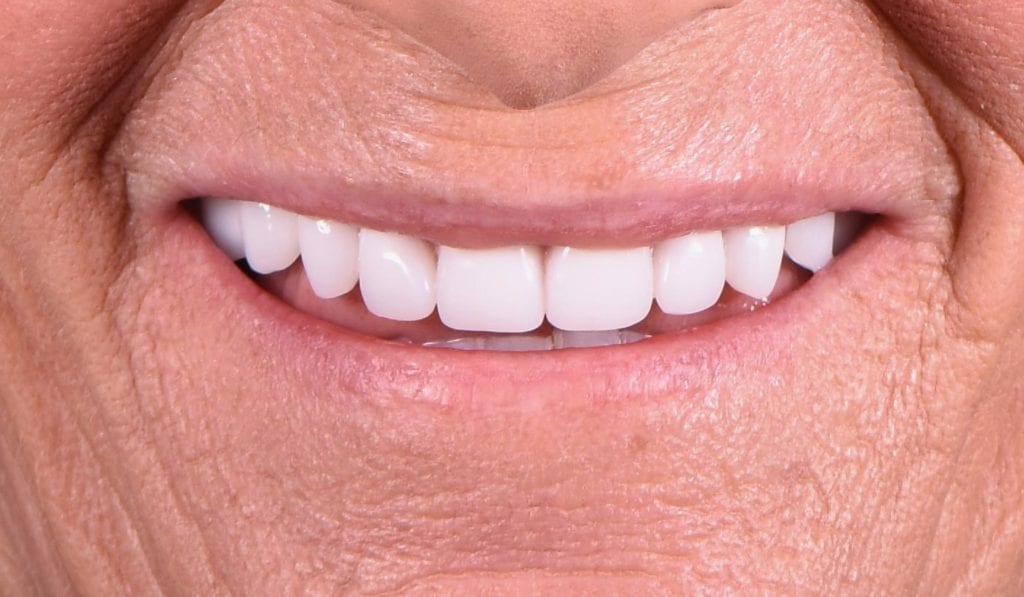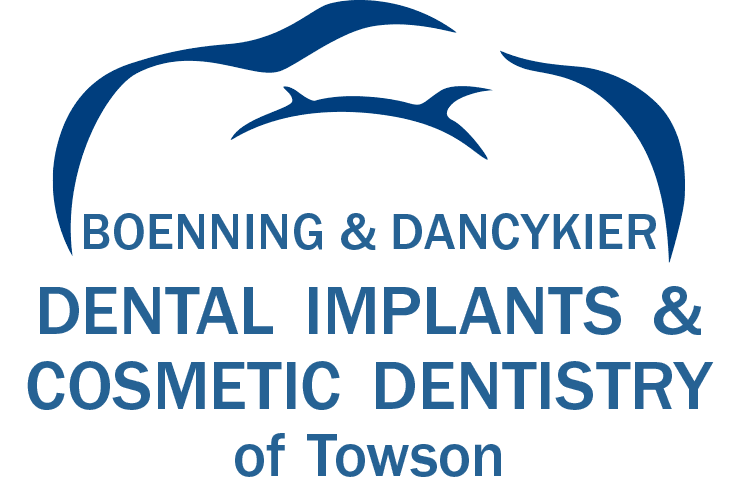Do you have several missing teeth in a row, or maybe entire rows of missing teeth? Dr. Keith Boenning and Dr. Nathan Dancykier offer dentures in Towson, MD, to help you replace missing teeth. We use full and partial dentures to replace lost teeth with prosthetics that look natural.
Dentures can be either removable or fixed with implants. We often suggest implant-secured dentures, especially for those with a full arch of missing teeth. Dental implants can restore your bite and feel like natural teeth.

Benefits of Receiving Dentures
Replacing missing teeth is important for your overall health, oral health, and appearance. You might notice a change in your face shape after getting dentures. This is because missing teeth can cause your face to sag and develop deep wrinkles. Dentures can help fill out your face and reduce sagging and wrinkles.
Missing teeth can make it hard to eat many types of food too. Dentures can help balance your bite and make it easier to enjoy the foods you love, including those you need for good health.
We Offer Several Types of Dentures in Towson, MD
We have several types of dentures available at Dental Implants & Cosmetic Dentistry of Towson. The right one for you depends on a few things, like how many teeth you’re missing and where the gaps are. For example, dentures can replace just a few teeth or a whole arch of teeth.
From your first visit to the final placement of your new denture, our team handles everything. We make sure you get the best results. Let us know any concerns or issues you have along the way so we can meet all your needs.
Full Dentures
Full dentures are for patients missing a whole arch of teeth. Full or complete dentures consist of false teeth that sit on an acrylic base. The acrylic base looks like gums and blends in naturally with your mouth.
Your full dentures stay in place using suction or adhesive. However, you need to remove them for at least 7 to 8 hours each day to give your gums a break. Most people do this at night while they sleep and soak the dentures in a solution overnight.
Full dentures can help you chew and speak better. They improve your oral health by protecting any remaining teeth and supporting your facial muscles.
However, full dentures can be uncomfortable at first as your mouth adjusts to them. They might need regular adjustments or replacement as your mouth shape changes as you age. Some patients also have trouble with the fit and stability. Ill-fitting dentures can make eating certain foods or speaking clearly more difficult.
Partial Dentures
Our dentists might suggest partial dentures if you’re missing several teeth but still have some natural teeth left. This could be because of decay, injury, or genetic issues. Partial dentures help with chewing, speaking, and improve your appearance by filling the gaps left by missing teeth. They replace several missing teeth in a row.
They consist of replacement teeth that sit on a metal or acrylic base. The base is pink and matches the color of your gums. They’re usually comfortable to wear during the day, but you should take them out before bed.
Partial dentures might also have a clasp to attach to your natural teeth. The fake teeth rest on your gum’s ridge. Plus, partial dentures are removable, so you don’t need to wear them at night.
Implant Dentures
Implant-secured dentures are a durable choice for patients with missing teeth. They use implants to keep the dentures in place. To get these dentures, you need enough bone tissue in your jaw, or you may need a bone grafting procedure to make sure the implants fit properly.
Implant-supported dentures use multiple dental implants to permanently hold the fake teeth in place. The oral surgeon puts these implants into your jaw. Sometimes, we can place a hybrid denture over one or more implants.
Hybrid dentures combine the benefits of implants and traditional dentures. They sit on top of your gums like removable dentures but attach to implant posts for extra stability.
Caring For and Maintaining New Dentures
Now that you have dentures, you should know how to take care of them. Proper maintenance helps them last longer and stay comfortable in your mouth. Here are some tips to keep your dentures in good shape.
You Must Clean Dentures Every Day
You need to clean your dentures every day. Just like natural teeth, dentures can collect food particles, debris, and plaque. Use a soft-bristle toothbrush or a denture brush with a non-abrasive denture cleaner.
Always rinse your dentures with cold water only. Never use hot water. Hot water and high temperatures can warp dentures, and make them not fit properly.
Handle your Dentures Carefully
Dentures are delicate, so handle them carefully. When you take them out, clean them, or gently put them down in a safe place. They can easily break if you drop them, especially on a hard surface like a sink. Always handle them over something soft, like a towel, to help prevent damage.
Soak your Dentures Over Night
To give your gums a rest and to remove bacteria from inside the pores of the denture, you should soak them overnight. We suggest using plain tap water or a denture solution. You will also need to place them in water when you are not wearing them. This will prevent the acrylic from drying out and keep them free of bacteria.
Try to Rinse Them After Eating
Rinsing your dentures with water after every meal is a good habit. This will remove many of the food particles that would otherwise just sit on the prosthesis and in your mouth.
Visit your Dentist
Going to the dentist regularly is important for your oral health and to keep your dentures in good condition. Your dentist will check that your dentures fit properly and may clean them for you. This is also your chance to ask for advice if you have any issues with your dentures.
Frequently Asked Questions: Dentures and Partials
Dr. Boenning and Dr. Dancykier want to help every patient reach their best oral health. Getting dentures can restore your smile and help you more fully enjoy life. We understand that dentures can seem overwhelming because they are an important investment.
Our dental office in Towson is here to answer any questions you have about dentures. We offer a friendly environment where you can ask anything. Check out our frequently asked questions about dentures, and if you still have concerns, feel free to contact us directly.
Are traditional dentures comfortable?
Traditional dentures should fit comfortably and stay in place without slipping or rubbing your gums. If you feel any discomfort while wearing your dentures, see our dentists as soon as possible. They can make adjustments to fix the problem.
You can also ask about implant-supported dentures, which can be more comfortable. These dentures are a stable option for people who have trouble with adhesives and shifting.
Can you leave partial dentures in all the time?
No, we don’t recommend keeping partial dentures in your mouth all the time. You should take them out at night so your gums and the bone underneath can rest and breathe. Taking them out also lets you clean your dentures well and keep up with your oral hygiene routine.
How long do implant dentures last?
Implant dentures are a long-term solution. Most dental implants can last a lifetime, and implant-supported dentures can last up to ten years. How long they last will depend a lot on how well you take care of them. Be sure to visit your dentist routinely for check-ups and maintenance to keep your dentures in good shape.
How many teeth can a partial denture replace?
Partial dentures can replace any number of missing teeth in different spots in your mouth. They usually replace up to four or five teeth in a row. Many people choose partial dentures to replace several teeth in a row or even just one tooth. Another option is a dental bridge, which is a more permanent choice.
What is the average age for getting dentures?
The average age for getting dentures is typically in the 60’s or 70’s. However, some patients may need dentures at a younger age, so it all depends on the person. Almost everyone qualifies for conventional dentures. If you are missing several of your natural teeth and want to improve your mouth, denture treatment may be a good option for you.
Do dentures prevent bone loss?
Dentures won’t stop bone loss, but they can help you chew better and improve your smile by filling in missing gaps. You still need to take care of your jawbone. That’s why implant-supported dentures are often better. They help avoid the natural bone loss that happens over time after losing teeth.
Book your Appointment for Dentures Today in Towson, MD.
Dr. Boenning or Dr. Dancykier at booking appointments for patients who are interested in getting dentures. Request an appointment today to learn more about the types of dentures we offer. You can also call our Towson, MD dental office at 410-324-2294 to book your appointment.
